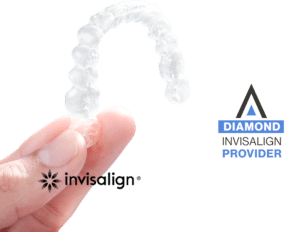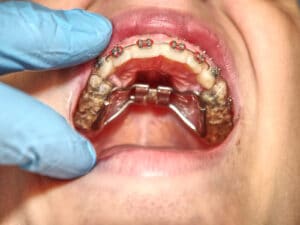Seeing a dentist vs orthodontist is a question that many patients ask themselves when they need oral health care. Maybe you don’t know what the differences are between them and you can’t decide which one is best for you.
Deciding if you need to see a dentist or an orthodontist is not as difficult of a decision as you might think. Both treat dental issues, but there are several differences between the two professions that potential patients should be aware of before making a choice.
What is a dentist?

A dentist is a doctor who specializes in oral health care and treating a wide variety of dental problems. Basically, they handle overall dental care, including routine check-ups and dental procedures. For example, dentists check the overall health of your teeth and mouth, fill cavities, place dental crowns and veneers, and provide cleanings.
Dentists also provide preventative care and education to their patients to help them take better care of their teeth at home.
What is an orthodontist?
An orthodontist is a dentist with special training to diagnose, prevent, and treat irregularities in the teeth and jaws, particularly misalignments that could require braces of some kind. Problems orthodontists treat include:
- Overcrowding
- Crookedness
- Gaps between teeth
- Underbite
- Overbite
- Crossbite
Treatments for these problems include:
- Traditional braces
- Lingual braces
- Ceramic braces
- Self-ligating braces
- Removable clear aligner technology such as Invisalign®.
Basically, if your problem is affecting your bite and smile, an orthodontist is who you want to treat you.
Dentist vs Orthodontist Education and Training
A big difference between dentists and orthodontists is how much education and training each receives even though both receive a lot of the same education and training.
-
Training Dentists Receive
Dentists must earn a pre-dentistry or pre-medical degree in college, often in biological studies. They then attend dental school where they receive extensive training, which often includes a residency prior to certification. Two years of their training occur in the classroom and labs, while another two years is spent treating patients under the careful supervision of an already licensed dentist.
-
Training Orthodontists Receive
Orthodontists also must complete a college degree and attend dental school, but they go on to receive an additional two to three years of training and education in a residency program to obtain a specialty certification in orthodontics. They also must complete more certification tests.
Overall, an orthodontist will spend 10 or more years studying and training before being able to practice orthodontics on their own, making them highly qualified professionals.
Should I see a dentist or an orthodontist?
Determining whether you should see a dentist or an orthodontist really depends on what type of dental problems you are experiencing. You would not see an orthodontist about a minor toothache or get teeth cleaning. These kinds of problems are usually handled by a dentist, whom you should think of as a general practitioner with qualifications to treat a wide variety of dental issues.
An orthodontist is a specialist who handles complex misalignments in the teeth and jaws. They have a deeper understanding of the teeth and jaws and how to fix them. If you think you need braces, an orthodontist is who you need to see.
Can a dentist do orthodontics?
A dentist can legally perform orthodontics, but they are not specialists. Orthodontists have more training and education in orthodontics, which makes them the preferable option if you have a misalignment in your teeth or jaws that needs to be corrected. Your general dentist could also have this training and be an orthodontist, which means they provide both general and more specialized care.
Do orthodontists provide general dentistry?
While orthodontists have general dentistry training, they mostly leave general dentistry to a general dentist to perform. Again, orthodontists are dentists who specialize in treating teeth and jaw misalignments. A general dentist is the appropriate professional to see if you need treatment for cavities, gum disease, and other problems that need to be treated prior to orthodontic treatments such as braces.
Orthodontists are specialists, but they work together with general dentists to provide the best care for your teeth.
Do I need a referral to see an orthodontist?
For the most part, you generally need a referral from your general dentist to see an orthodontist. Some orthodontists don’t require a referral and you can typically schedule an appointment with them if you think you need braces to straighten your teeth. However, a referral may be a requirement by your dental insurance provider in order to pay for any orthodontic treatment you need. Therefore, if you have a teeth or jaw misalignment issue, see your general dentist to get a referral to see an orthodontist. Both professionals will then work together to get you the treatment you need.
Dentist vs Orthodontist Cost
Because orthodontists are specialists, their services will cost more in comparison to general dentistry. But your dental insurance may cover the cost, at least partially. Both dentists and orthodontists also offer payment plans to help you afford their services.
Dentists and orthodontists are generally not in competition with each other for patients. General dentists will refer patients to see an orthodontist if they believe their patient needs to see one for special treatment. Orthodontists, meanwhile, leave general dentistry to the general dentist. The orthodontist and dentist may even work in the same practice.
Contact Us
If you have teeth or jaw misalignments that need correcting, Dr. Bob Bryan Orthodontics is ready to see you and give you the treatment you need. We are a top Invisalign® provider with a Diamond rating and have been in practice for more than 50 years straightening and improving smiles. We use the latest techniques and the most up-to-date technology to help you achieve a healthy smile that will last for a lifetime.
Contact Dr. Bob Bryan Orthodontics Today! We have locations in Allentown and Hamburg in Pennsylvania. To contact us, please call our Allentown office at 610-435-2788 or our Hamburg office at 610-563-5185 today! You can also visit our website. We offer complimentary consultations. Don’t wait to seek treatment. You can have the smile you’ve always wanted.









